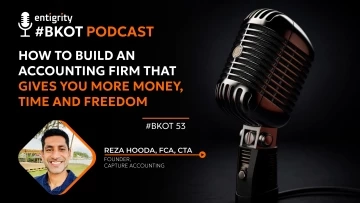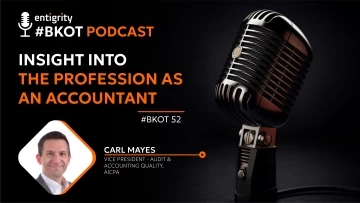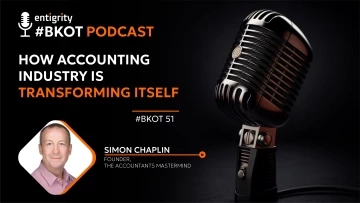This is the fourteenth episode of our series BKOT: Build a KickAss Offshore Team. Watch this podcast about some of the best practices that can be done by accounting firms to be 'True Business Advisor' with Chris Rivera & Matt Solomon. The podcast episode will bring clarity on Mindset around Attracting Clients, Pricing, Selling & Delivering advisory work.
#BKOT 14: BUILD A KICKASS OFFSHORE TEAM
NEW BEST PRACTICES FOR ACCOUNTING FIRMS TO BE A TRUE BUSINESS ADVISOR
Hosted by: Chris Rivera, Director Client relations, Entigrity Offshore Staffing
Guest: Matt Solomon, CEO, Center for Enlightened Business
Chris: Hello everybody, hopefully you have a good holiday weekend we spoke on friday I was remote I'm back in my home office in midtown New York city so I have a special guest with me today Matt Solomon who is the CEO of Center for Enlightened Business and very excited to have him, he'll be doing an introduction in a moment but I want to let you guys know last week we talked about blockchain and remote working on practice management so today our our title is along the lines of ‘best practices for accounting firms and becoming a true business advisor’. So Matt awesome thank you for joining me today so please tell us about yourself and give us a full introduction.
Matt: Well thank you Chris it's my pleasure to be here I was very excited when you reached out to do this and so a little bit about us Center for Enlightened Business, I'll talk about it on a couple levels in essence what we do is we help accountants the small to medium-sized accounting firm owners bring in really high profit monthly work to dive down a little deeper what that really means what that looks like is we're bringing together not just the systems and the processes to do that but also a little bit of a unique perspective on the mindset component so what I'm sure we'll talk about those a little bit in essence so what results look like for us with our clients is that we help clients bring in somewhere between about $3K to $15K per month per client and new engagements and really the sky's the limit on how many of those they can bring in even for small firms.
Chris: Wow awesome and you guys have been doing this how long now?
Matt: So about 25 years more than longer than 've been in the company so we started off for for some of the older folks who are listening to this or the the buffs in the accounting space so we started off as a company called Raz results accounting system out of Australia at that time and the thread that's gone through all these name changes over the years has been helping accountants become advisors and getting paid for it so we started off as a company called Raz out of Australia eventually became ran one I'm sure some of the people may have heard of that in the late 90s early 2000s and then you know have changed our name recently to the Center for Enlightened Business .so we've been doing it for a while I've been here for about 15 years and I won't tell you how young that was when I started.
Chris: No worries, so yeah the the accounting world got not necessarily flipped upside down but a lot of things have changed and been pushed forward that might have been on the back of their mind for CPAs out there and you know trying to become an advisor help the clients in different aspects and so you know the ones that were doing it already awesome you know pandemic or not they were rocking and rolling but those who are or were trying to provide this guidance and help I mean what did you see and what do you recommend somebody just seeking some help and and how to go about this like where to start.
Matt: Yeah it's a great question I think the crazy thing is and I've watched this over the years it's not a new conversation that we need to be business advisors I think it's a more popular conversation now but there's still a lot of questions on even what it means to be a business advisor I had some conversations with some very prominent people in some huge companies in the accounting space people who are technically the heads of advisory in these these major corporations and they tell me behind closed doors like I don't really even know what advisory is what is it and so I think if if at the top we don't understand as the thought leaders in the profession what advisory is then it's very difficult for the everyday accountant who's super busy doing work and getting things done and putting out fires and trying to maintain and trying to navigate to understand what it is so our particular style and I think it starts at identifying Chris what does it mean to be an advisor and then we can get into some of the best practices for how to actually get there what it means to be an advisor can be different for a lot of people and I don't know how much I'm allowed to be against the grain here in this conversation but what I'll say is a lot of this stuff we're hearing about client advisory services and all that I feel like people are coming into the profession thought leaders are coming in and they're solving the problem that accountants are working too hard and not getting paid what they're worth and not embracing their value and not doing fulfilling work, they're solving that problem but they're solving it as Einstein said “with the same level of thinking that created the problem” in the first place and so I'm paraphrasing there I know if you don't quote Einstein perfectly then it's probably not good, so what's happening is we're making these incremental changes client advisory services is this big push but it's like well what really is it well you're charging a little more you're charging maybe a few hundred bucks a month instead of what you were or you're converting clients to monthly engagement that's cool but what I'm here to say and share with you is that there's an opportunity if you fully embrace the role of being a business advisor to get paid really well and to do transformational work for your clients now a couple things and you cut me off anytime you need to. I want to define it but I also want to talk about it from another angle what it really means to be a business advisor is that ultimately you're helping your clients grow and become more profitable with small business owners at the end of the day it's not about your time it's not about all those things it's about the impact client the business owner just cares about the results you can help them achieve and the beautiful thing is you don't have to know all the answers it's just a matter of asking the right questions but here's the problem here's the catch and here's the rub accountants number one are too busy and so they're not always playing this role proactively and the other thing is they're giving away a lot of this information for free as part of what it means what accountants need to do to be the business advisor is to formalize that role to do it more proactively and what we've seen is as they start to do that and as you tap into the goldmine you're sitting on in your existing client base as you have a different conversation and reframe the relationship you can start to earn a lot more per client without doing any marketing but you can also start to let go of those clients that are weighing you down and holding you down the last thing I'll say Chris on this is what we see as we break down a revenue per client with our clients is what they're they're sometimes spending you know 30-40% of their time on their bottom five or ten percent of their clients so you're wondering why you're so busy you're wondering why you're so busy it's like well you're spending time with the clients that you that aggravate you the most that pay you the least that sometimes you have to chase for money and you're wondering why you can't spend more time doing more meaningful work it's right under your nose it's right there so sorry for ranting so long Chris I'm passionate about this stuff man.
Chris: I could tell no that's why I have you on here today very excited because it's important because I run into the same thing right I mean I'm doing the staffing but I first need to identify you know where's the gap of with the firm right is it in the low level, mid level, senior level and trying to figure out how we could help and I've noticed I'm speaking with a few hundred of accountants over the last few months is everyone's jumping on board to do the advisory and consulting and they're asking us to help with the back office work with the staff and I provide some input it but I think that you're absolutely right is that they're just they know they need to do it they're just jumping on board but formulize proactively I wrote that down that's something that they're just thinking they just need to do it and it's just going to transition right away it's not so much you need to really identify that and yeah the you're going to have to kind of how did how to onboard your new clients and what the expectations are and everything so in the beginning it's important first to identify so now you know what you want to focus on how you want to grow that side now you've got the staffing done and it's in place so what are the next steps what what do you guys recommend?
Matt: What I will say is this the back office stuff is key and I'm not I'm not trying to plug what you guys do we have a lot of clients who are mutual clients and they have a lot of success and so one of the things that makes it challenging is when you have so many clients and you're bogged down in the work that is more commodity based and commodity driven it's challenging to get out of that and what we've seen is one fantastically successful approach is when they bring in a company like yours to help them just take some of that burden off what I view it as it's like they just have a few moments to breathe again and when they breathe they can refresh and think about where they want to go and start working on more valuable work so something that I've seen, I haven't used your product but I have clients that do and I will tell you this it's very rare that I vouch for another company out there I try to protect our reputation but I've heard only great things about you guys so I just wanted to share that so what's missing from from the system itself or what's what's missing is a couple things I think number one it is a system I think so many accounts are hearing that they need to be business advisors but nobody's defined it for them so we talk about growth and profitability super important but the other thing is how if you look at how accountants are consuming information on it they're attending a webinar here and there but what's happening is they're getting stuff piecemeal so they're going to watch a webinar and how to price their services the right way or how to sell something it's not coming from the same system and because of that there's often contradicting ideas there might be a model of pricing or putting bundling your services or all these things and you start hearing it from you know 10-20-30 different sources it's wonderful to go and get educated on these things but at some point it gets overwhelming and nothing's connected so one of the things that I see best practice wise is having a holistic system to learn how to do the marketing that brings in this high value work to learn, how to price in a way that's connected to bringing in the right type of clients that you're looking for but also doing the work that's fulfilling and meaningful to you, but the other side of it is accountants have to learn how to communicate their value at the highest level aka one of the dirty words in the accounting space which is selling. Accountants have to learn how to sell and I think they're so worried and there's so much negative connotation around selling that accountants are they don't want to be the used called salesman they don't want to be pushy but the way that I look at sales is sales is a way to communicate as a form of service to others and if you get good enough at communicating then you can help people if there's a business owner out there for example that you know would be better off with your expertise and you don't do everything you can out of in a place coming from a place of entigrity and service then you just did a disservice to that person so having selling skills I think is important and if you do it in a way that's congruent with your personality if you do it in a way that has integrity it can be a beautiful skill to have and then the last piece that I think in that system is being able to have a system for delivering advisory work so once you understand what the clients are actually looking for you have to know how am I delivering this there's so many models out there and so you know there's stuff we encourage initial planning sessions and monthly and quarterly meetings and things like that but at the end of the day you need to be confident in a system whatever it is wherever you go whatever you choose because what we've seen is the great sabotage that accountants are bringing to the table and bringing in high profit advisory work is they're so full of integrity that they won't go sell something for a lot of money if they're not a hundred percent sure on how to deliver on that and because of that they're stopping themselves from bringing in this work and the reality is it's very simple if you know that whole equation together you can learn it very quickly and that is what will give you the confidence to go out there and serve people at the highest level.
Accountants have an incredible amount of knowledge about small businesses because all they do is look at the numbers and they're not doing enough with it they're playing small and I think my push to the profession to stop playing so small and step into your power and understand who you really are and what value you really bring to the table.
Chris: Yeah it's spot on with what you said is the confidence and so obviously they're ready to make this leap many ready to make this change and and they must have a plan in place but then you know the selling skills is going to be tough but they have to take a look at inside themselves and say how did they get their clients, already you know the clients that are happy with them they like them, they trust them and they're working with them and so they need to just build off of that right and yeah the ones that are not too you know marketing and getting their name out there that's a whole nother side but you have to see how you built your base now and how you can expand of tha so they're doing something right in the beginning there's always room for growth but yeah you got to be confident in what you're doing and then you have to have a plan in place now you're executing it so now as far as the client right so we're up to the client aspect of it you got the client on board you got the staff in place now what?
Matt: Yeah so Ii think you know I want to answer that question directly there's a piece that's missing though and this will answer that indirectly and then I'll speak to it, so on the client side they're just looking for help right now and what covid and the global pandemic and this uncertain economy what it did was it just brought issues to the surface and it expedited them companies that didn't have enough cash flow to survive got killed right those kind of things so it's not like covid created in some cases in most cases didn't create these problems it amplified them so what clients want they just want guidance they're just they're business owners that need help and it's like this Chris if you went to a doctor and you got blood work and the doctor gave you a big report with all these numbers on it and said here it is let me know if you have any questions that's sort of what accountants are doing with small business owners there's all this information they can interpret it they give it to you and it's let me know if you have questions like what the heck like sure what do you think tell me like turning it around and around. Accountants are having that same conversation they take for granted that they understand what the blood work of the business is saying what they need to do is sit down with the small business owner and start to ask questions and understand these things deeper a lot of which is probably happening but again they're giving it away for free and the clients don't value it when they're not paying for it and so part of it is understanding the role that you are playing but let me step back a little further and I don't mean to take this where it doesn't need to go but what we found is key in all this more important than the process is more important than the systems is this piece and I'm about to get weird on everybody here so I apologize but we were bringing software to the table years ago as rand one there were some people who used it and had great success and some people who just didn't embrace it and every conversation I have with every software and tool and resource company out there in the accounting space it's still happening so what we discovered is that the tools and the processes are super important the services are incredibly important but if the accountant doesn't ultimately see themselves as an advisor who can do accounting work then they're never going to actually build the advisory firm and have the get the revenue they want to have the life that they want and serve people that they want what's happening is the identity that the accountant is coming from is I'm an accountant who wants to dabble in advisory and what you need to fundamentally shift is your identity your belief system about who you actually are and embrace the role of the valued advisor and then you can provide accounting if you want to we that's what it ultimately comes down to and people have different desires for what they want I don't think accountants understand what it really means to be an advisor at the highest level and get paid for it and I also don't think they know how much better their lives could be if they embrace that style and that's been the challenge for 25 years in this space. Accountants are so comfortable doing things the way they did yesterday that even if it's uncomfortable even if it means 50-60-70 hour weeks they're still willing to hold on to that old way of doing things it requires a fundamental shift in identity and then plugging into the systems that will get them there that we've seen is the formula that's the formula that we've seen you do those things together and there's a lot of companies out there that can help you you do those things together the sky's the limit in terms of doubling tripling 10xing realization rates cutting hours in some cases by 50% or 75% amazing things are happening but it doesn't happen unless you start to move into that new mindset.
Chris: Yeah and change is constant right pandemic or not there's change is always going to happen and you need to be prepared for it. I really without giving away my age I was around when the first computers were hitting the market and then you know I got a cell phone a big old cell phone and you had to pay for a minute beforehand and like one minute left and you'd be telling your friend hurry up you have 40seconds that type of deal and but I've literally embraced technology as i've seen it evolve and continue to grow and just change our lives and so any whole point of saying this is that there's been so much change in my life and I've been just embrace it do you think that's the case with the accounting community and if not you know some ways to kind of .overcome that.
Matt: Yes so i think if you look at the psychological profile of the accountant they're not somebody who they're not people who inherently embrace change at all there's obviously the early adopters there's a laggard you know we all know the adoption of technology curve now that Simon Sinek really brought to the table for us but the the reality is going into this profession people go in for a couple reasons one is to help people which I think most accountants want to do that and the other thing is because it's structure because there's consistency in it because they're step-by-step processes that they can follow to be an accountant to work with the numbers and not the people and I think so inherently if you look at the psychological profiles of accountants which I've done many times they don't like change they went into the profession because they like the consistency and the stability of systems and things that are not changing often and so but the problem with that Chris is to your point to what I think you're alluding to is that is getting in the way of actually having a practice and a life and a lifestyle and an income and a level of impact on the community and the clients in the world that they want to have and so the challenge is how do you help somebody who's so comfortable with status quo to embrace a change that serves them even if they think it might be better and that's where what we've come down and discovered is that it comes down to fundamentally learning how to let go of old belief systems so the old belief system that says I have to do it this way because when I joined the big big accounting firm they taught me to do this and then the partners before me worked really hard and then if i wanted to be a manager I had to get up there and partner blah blah blah and it's just this old pattern of behavior that until we stop and examine it we are destined to repeat it and stay stuck in it and so there's always people out there talking about technology and AI and all these things are going to change the accounting world and it's like accounts I don't think we care about that but what we need to know is that change if we that there's a better possibility for a better life of service and enjoyment, if we learn how to do things in a more intelligent way I think a lot of times the education stops at the last webinar or even the accounting degree and what we have to do is continue to evolve and step into that it's the most fascinating part of what we do is helping people step into that role.
Chris: Yep absolutely, so we're winding down now I learned quite a bit and valuable information and as far as best practices and developing your firm for the future per se so any final thoughts or anything else you want to say before we go.
Matt: Yeah I think you know what what we're all trying to do what what you guys are trying to do we're trying to do is to encourage accountants to challenge what is known for them and to start embracing a different way of doing things and we're not doing it for the sake of changing we're doing it for the sake of what's really possible so if you're an accountant out there who's working more hours than they want to be if you're doing work that's not fulfilling and rewarding if you are feeling stuck if you're feeling burnt out if you're feeling unfulfilled then you have to start looking at new ways and so whether it's bringing people in and getting more support on your team and outsourcing staffing which is a phenomenal way to free yourself up or whether it's embracing programs or technology is different I really encourage you to step back for a moment and just examine if your life if your practice is what you want it to be and if it's not there are a lot of resources out there Chris and I can certainly help you if you want to look at what's actually possible for you so that's all i'll say don't be afraid and don't believe in anything that limits you.
Chris: Awesome Awesome well said, all right everybody so again hopefully you learned a lot today we'll be coming back in about a week or two with some more special guests that are coming up. This was episode number 14 of #BKOT how to build a kick-ass offshore team. I want to thank Matt Solomon from Enlightened Business for joining me today and providing insight. Please take a look at their website www.enlightened.business and for now take care and have a good weekend everybody again thanks for joining.
Matt: Thanks Chris, thanks everybody.

_1642676318-1686039629.webp)



